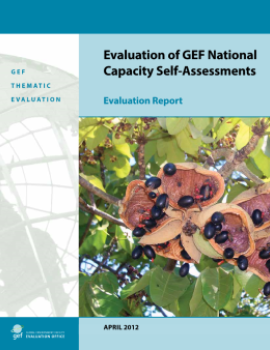At the request of the GEF Council, the Evaluation Office conducted an evaluation of the GEF support to the National Capacity Self-Assessment (NCSA) program. The evaluation was conducted fully and independently by the GEF Evaluation Office with support from the GEF Secretariat, GEF Agencies, governments, and civil society organizations. Findings and recommendations from this evaluation was presented to the GEF Council, at its November 2011 meeting.
The evaluation provides the GEF Council and others in the GEF with lessons, experiences, and recommendations coming from the implementation of NCSAs as inputs to the development of a new GEF strategy on capacity development. The evaluation had three areas of focus: relevance, efficiency, and results (and their sustainability). Each of these areas was developed through a series of key questions and sub-questions. The framework for the evaluation was based on the theory and key principles behind the development of NCSAs, their objectives and expected results.
The evaluation identifies the NCSA initiative as a central part of the GEF strategic framework for capacity development and as the first assessment of environmental capacity needs and capacity development priorities at the national level with a global reach. The evaluation found the NCSA initiative to be highly relevant to the national sustainable development agendas and to the capacity development strategies of implementing agencies and of multilateral environmental agreements (MEAs). The evaluation also identified room for improvement regarding the NCSA's "One-size-fits-all" approach, the inclusiveness of participatory processes as well as the incorporation of NCSA results into GEF and Conventions programming and strategy. Based on these conclusions, the evaluation recommends the integration of NCSA experiences and lessons learned in a new GEF strategic framework for capacity development as well as the further use and dissemination of NCSA knowledge products.
